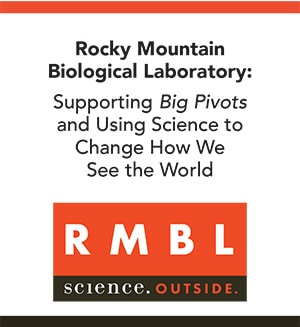Colorado became the first in nation to regulate companies that offer sperm donors – but weren’t necessarily honest about who the donors were
by Allen Best
You would think that Steve Fenberg would hope to be remembered for legislation that guided Colorado’s pivot in energy. But it was something entirely different that he considers his largest single accomplishment. This part IV of five parts of an itnerview conducted Sept. 10.
During the bill signing held in Boulder during May, for the distribution bill, your daughter was crawling at your feet. What is one accomplishment of yours that you hope she will savor among your accomplishments, that she will savor when she is the age you are now?
I would actually probably mention a bill that has not gotten very much attention and is not a climate bill but is related to, human rights. It became the first policy in the country to provide rights in law to people who are conceived with the use of assisted reproduction. Essentially, children that are born because of an egg bank or a sperm bank.
I’ve just been fascinated in recent years as I’ve learned there are millions of people out there that don’t know their genetic background. It’s not every day where you come across a sort of a group of people who clearly have never been given any thought about their rights because they don’t even know each other.
It’s not a demographic group, it’s not a diaspora, it’s not a religion. Many of them don’t even know that they are in this group. And with modern science, they’re all finding out, because they’re all taking 23andMe tests. Something I would like my children to be proud of isn’t necessarily that particular policy, but what I think the policy represents, which is not just fighting for the rights or for the cause of the day, because it’s sexy, because you can get more tweets, retweets or likes on Twitter, on Instagram, but because there’s a genuine need, and it is something that will improve a lot of people’s lives.
How will it improve their lives?
How much time do you have? In the early 1980s it started to become a practice, not used in a massive way, and it wasn’t all that mainstream, until it became sort of a private industry, and it evolved over time. It’s when they realized they could freeze sperm and use it many years later. That’s when people started seeing dollar signs. It became a product. It’s not a medical procedure in a doctor’s office, it’s a product that you can sell to consumers. By that, I mean, you can freeze it, it can be from one individual, and you can sell it to hundreds of people.
And the beginning of the industry was based on one fundamental rule, anonymity. Never tell anybody that you did this, even your child and the couple. These are generally heterosexual couples that had trouble conceiving, were basically told to, like, brainwash themselves.
They would do the procedure, not a complex procedure, and they said, go home and have sex, and you might get pregnant, and you’ll never know, was it the procedure or did you just get lucky that day? They were told never tell your child, because your child, it might actually be your genetic child. You don’t know. We don’t know. The child doesn’t know, and it’s a legal contract. So it evolved. Venture capital got involved and all this stuff.
Now fast forward to today. You basically shop out of a catalog, and it’s all anonymous, and everybody is told no one will ever know. Fast forward more and we’ve got 23andme and genetic testing, and what we have now learned is because the basis of the industry was anonymity, secrecy.
So the catalog will say so and so Mr. Smith, went to Harvard, speaks three languages. He’s a physicist, you know, long blonde hair, blue eyes, whatever it is, and the industry realized that guy sells. So they keep having him come in and he sells to thousands of families, and he gets a profit, and the industry gets a profit, and these families get what they think is a great product.
Then you find out all these families, their kids start having very bad emotional issues or schizophrenia or drug addiction or you name it, or kidney disease. And you realize today that actually that guy was homeless, and he lied, and the industry knew he lied, but his product kept selling. As long as they look the other way. And all these families are starting to realize that they were part of a fraud, and the kids now are 20 , 25 or 30 years old, and they’re all becoming lawyers or whatever, and they’re starting to fight back, because they realize that their entire identity was a lie, and there’s literally millions of them, and nobody has ever regulated this industry until we passed a bill in Colorado, and it’s still getting implemented. We don’t even know exactly how it’s going to roll out.
The docs says that when the child turns 18, they have an inherent right to the file to know who the donor was, their medical history, etc. And the idea is that if you say it will be transparent, it changes the type of people that donate, and it actually requires the industry to validate the information.
It’s a crazy situation, and it’s not something anybody really ever thinks about.
And you were the prime sponsor on this bill. And the fraud, is that what drove you on this?
Yes, but I think as I looked more and more into it, it became something deeper than that, which is maybe two things. One is the idea of private industry profiting off of the creation of people, which is a little weird. And maybe that’s fine because it helps many families to have a child, but it should be regulated. In fact, it should be very carefully regulated. We very intentionally and precisely regulate artificial reproduction of cows in this country, like very serious regulation of inseminating cows. Everything is tracked. I had no idea. I mean, it’s, it’s a big industry helping ranchers create cows. We don’t do it for basically the exact same type of industry for humans.
The second piece is that in a world in which we are increasingly obsessed with identity, at least on my side of the political aisle, I think it’s hypocritical to not care about an issue where people are lied to about their identity
If identity is important, then I think we have an obligation, a moral obligation, to help some of these people learn about what their identity is, not to mention medical history? So if, if cancer is very prominent in your family line, but you don’t know because somebody lied to you on what your family line is, you’re more likely to get cancer early and die than if you knew, and you would get regular checkups and you would keep an eye on them. That’s actually where the rubber hits the road.
Did this bill face any significant opposition?
Oh, yeah, big, big time from the industry. It was the first one in the country., I could talk all day about that fight. That’s probably the fight that I’m most proud of.
Also in this conversation:
Part I: Steve Fenberg reflects on Colorado’s embrace of climate goals
Part II: On regulating oil and gas — and Xcel Energy, too
Part III: Talking about Colorado’s reliance on revenues from fossil fuels
During the last legislative session that I was seeing bills introduced in late April that were important ones. The process of convening stakeholders had been extensive, thorough. There was no opposition at that point. Nonetheless, the question was, shouldn’t we have a time limit, you know, when the bills could be introduced?
There actually is a deadline for bills. We just waive it all the time. We just grant exceptions all the time.
The legislative timeline and process is actually very well prescribed by the Constitution, mostly, but we’re only allowed to be there 120 days, and there are bill deadlines, and every member is allowed to introduce five bills every year, and every single bill gets a committee hearing and a vote.
That’s not how most states do it. In most states, the president or the speaker, if they get a bill introduced by a member that they don’t like, they just throw it in the trash and no one ever sees it. So we have a lot of things in Colorado that are infinitely more transparent and clear than other states, definitely compared to Congress, but actually compared to almost any other state.
Anybody can introduce a bill, and every bill has to get a committee hearing and up or down vote. That’s kind of radical, compared to other states, and we have these bill deadlines. But the reality is, is that if you have 120-day session, and you’re a part-time citizen legislature, you can’t always cut a deal or reach a negotiation or get the appropriate people to weigh in and work through all the really difficult aspects of a policy in that very prescribed timeline. Plus, things come up, right?
There are bills we introduced in April that I never would have thought were going to be an issue, because something happened, like finding 200 dead bodies in Colorado Springs, right? Issues come up, like that funeral home — the funeral home that said they were cremating bodies, but they actually just threw them in a dock. Things just come up.
Ninety percent of the bills follow a very clear process. But there are some high profile big bills that come at the end for whatever reason. I would say in a lot of ways, it’s because they require the more time and the intensive negotiations.
In the next and final installment of the conversation with Steve Fenberg, he talks about the prospects for passenger rail in Colorado. Some parts will happen sooner than you might think, he says.
- Ridding Denver-area homes of gas - February 5, 2026
- Gearing up for data centers - February 3, 2026
- How Colorado sees the Colorado River stalemate - February 2, 2026






